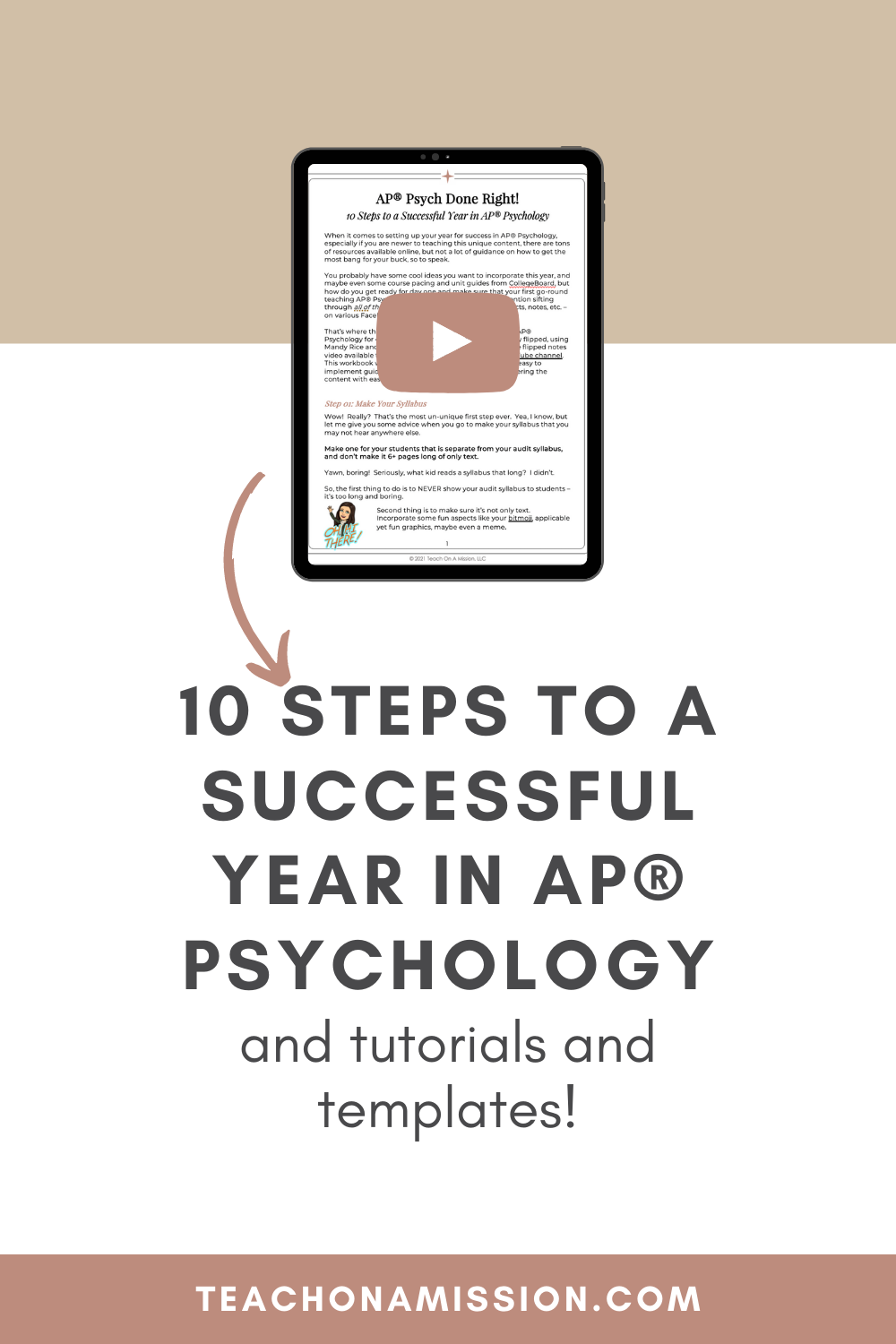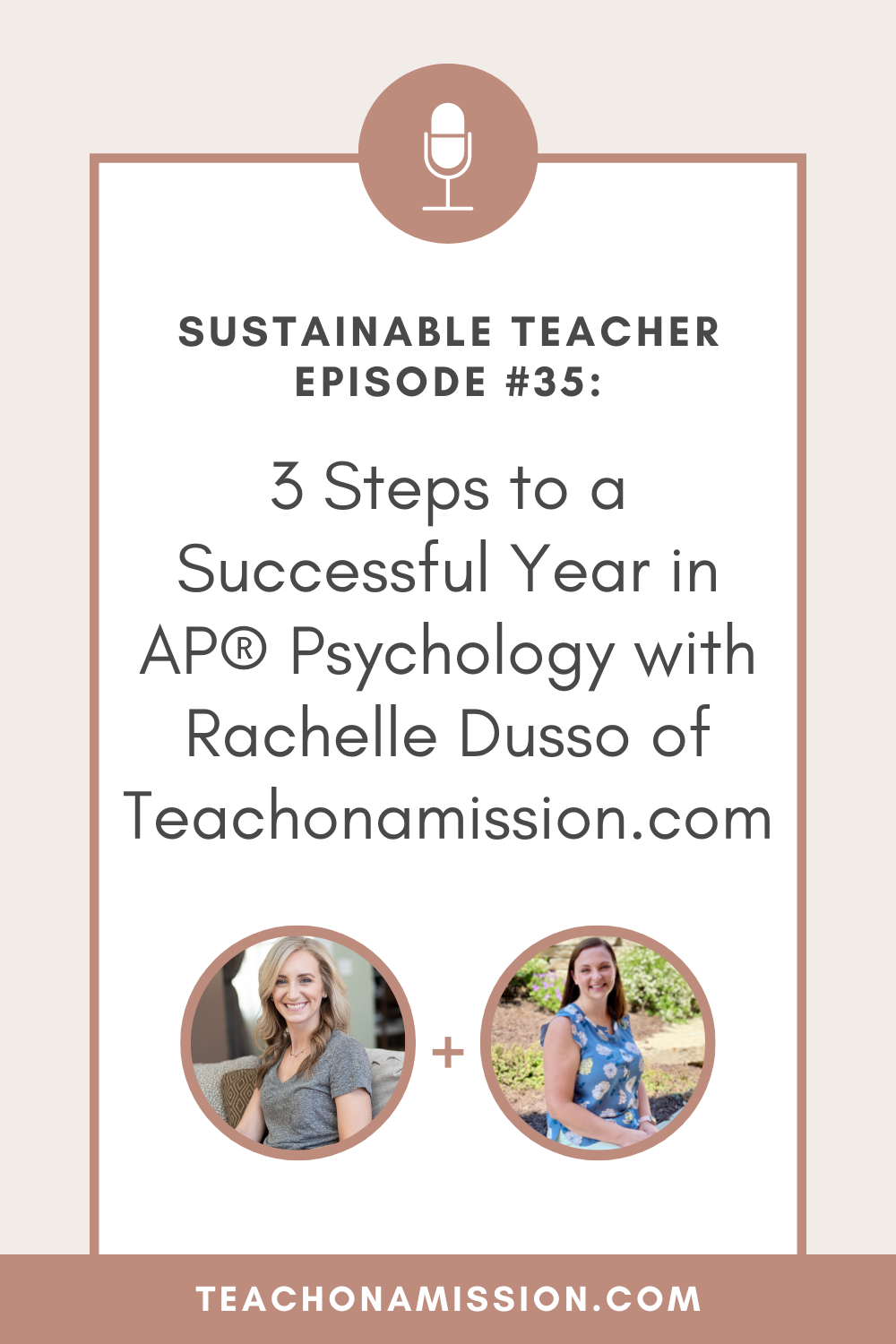3 Steps to a Successful Year in AP® Psychology

Guess what!?! Teach On A Mission, LLC, is growing, and I am so excited to introduce you to Rachelle Dusso in this episode. Rachelle is a five-year teacher in Wisconsin who is joining our team as the Content Coach for our Sustainable Psych Teacher membership for AP® Psychology teachers!
In this episode she not only introduces herself, but brings us 3 steps to a successful year for all our AP® Psychology teachers out there. But that’s not all… she’s got 7 more steps (plus a bonus)... that’s right 7 more actionable steps you can be taking this summer to make sure your school year is successful and sustainable in AP® Psychology.
Grab the full download - AP® Psych Done Right Teacher Workbook - at the link here.
To hear the full interview with Rachelle, please listen to the episode at the top of this page or on your favorite podcast streaming app - just search for Sustainable Teacher.
Rachelle is a fifth year teacher just outside of Milwaukee, Wisconsin, who teaches AP® Psychology and history. She has been an AP® Reader for the AP® Psych exam, has flipped her classroom, and will be the content coach leading our exclusive Sustainable Psych Teacher membership this year.
Rachelle’s Why
When asked why she decided to take on this new adventure and become a Content Coach with Team Teach On A Mission, here’s what Rachelle had to say.
“I remember being bored and overwhelmed teaching psychology. I was lecturing every single day and I didn’t feel like my students were “getting” it. I was working so much harder than them with the content, and that’s just not the kind of classroom I wanted, for me or my students.
I’m so excited to be helping new AP® Psychology teachers learn how to make this content accessible, both for the teacher and the student. The membership, and the coaching I’ll provide is about the content of the course, but it’s more about becoming sustainable as a teacher in a world where sustainability is not the expectation. No one will care about your sustainability like you or other teachers.
I’m so pumped for this year. This year is better than ever! We are going to be incorporating psychological research into the membership - allowing students to really make the real world connections between the content and how this affects their lives. And that’s all in addition to what will be provided on a unit-by-unit, month-by-month basis. Teachers in the membership will get all my student guided notes, all my powerpoint presentation slides, activities, quizzes, tests, pacing guides for each unit, and specific, targeted coaching in the content from me. I can NOT wait!
Advice for New Teachers
Rachelle tells us,
“The best advice I would give myself as a new teacher, and would tell current new teachers is that it is okay to say no. It’s hard starting out because you’re wanting to be a rockstar teacher, making a name for yourself as someone who can do it all, and deserves accolades and rewards, but being intentional about where you say yes is so important. You don’t have to say yes to every student club or extracurricular activity that comes your way. You don’t have to be on that committee or go to all the meetings. There is a way to be more sustainable from the start and that is by focusing on areas where you can be intentionally focused from the beginning.”
3 Steps to a Successful Year in AP Psychology
Remember to grab the full workbook, all 10 steps (plus a bonus) to a successful year in AP Psychology at this link, as these steps we list here are previews and an introduction to some great things you can be doing this summer to set your year up for success.
1. Plan Your Calendar

First up is that you should absolutely take the time to sit down and plan out your year. Grab a calendar app or blank paper calendar, plus your school calendar, and plug in all your holidays/inservice, etc. Then plan backwards each of your unit tests.
Use the percentages Collegeboard gives you for each unit to determine how much time you should be spending on each individual unit. They give you this crucial information so use it.
2. Be Intentional with Homework

When students in AP® Psychology could be taking any where for one to six or more AP classes, plus more of them are working and very dedicated to their extracurricular activities, you have to be intentional with the time you’re asking of them outside of your class.
Plus, if you plan out your calendar well, you shouldn’t need much more than your class time to fully prepare your students for the AP® Exam in May.
So determine what it is your students will be doing for homework (i.e. watch flipped videos, reading guides), pick one, and have them do only that. And it shouldn’t take more than 30 minutes, tops.
This is an awesome, engaging course, that when planned well shouldn’t require a ton of outside of class time in order to pass the AP® Exam.
3. Don’t Overthink the FRQ
Often times teachers new to this course learn about the FRQ (Free Response Question on the AP® Exam) and think their students must write essays in their course because there will be an essay on the AP® Exam.
That’s just not true.
An FRQ is NOT an essay. So don’t train your students to write an essay.
Focus on students knowing the content well, then all they have to do in the FRQ is prove they know the information. They’ll have to apply their knowledge to the prompt, and that takes some learning, but not like writing an essay.
To learn more about FRQ best practices, be sure to grab that workbook here.
Just for Fun
Question: Who is a teacher that has mentored you and how have they impacted your career? Why do you want that for other teachers?
Rachelle says,
“This is funny, because it’s you, Mandy. Mandy’s work in the AP Psych classroom and with flipping really changed the way I teach. After listening to just one of her workshops, I decided to completely flip my Psychology classroom and it has changed my life for the better. I am no longer spending hours and hours preparing slides and lectures. I’m getting through content and able to go more in-depth than I ever was and students are LOVING it. They are so grateful for the flipped videos come exam prep time.
I’m able to spend my evenings and weekends with my family, and Mandy has been the voice in my head helping me reach for more sustainability in my teaching life.”
I swear I didn’t put that question in there so she would say that, but it was nice knowing that our work here at Teach On A Mission is impacting teachers.
Where to go next
Don’t forget to grab the AP® Psych Done Right workbook for teachers: 10 Steps to a Successful Year in AP® Psychology, which is linked here.
Alright Teacher-friend, I’m so excited that you got to know Rachelle a bit more in this episode as a part of Team Teach On A Mission. If you know a psychology teacher who could benefit from reading/hearing this episode/post, please be sure and share it with them, because, remember, no one will care about teacher sustainability except teachers, so let’s support each other as we work towards more work-life balance.
I’ll see you same time, same place next week on the Sustainable Teacher Podcast. Bye for now.








